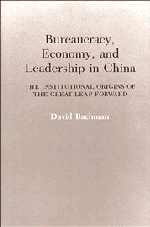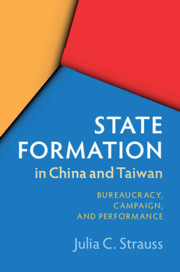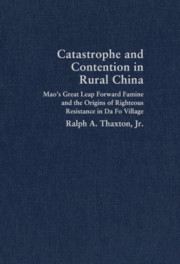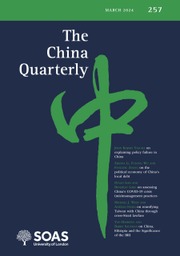Bureaucracy, Economy, and Leadership in China
In this book David Bachman examines the origins of the Great Leap Forward (GLF), a program of economic reform that must be considered one of the great tragedies of Communist China, estimated to have caused the death of between 14 and 28 million Chinese. While standard accounts interpret the GLF as chiefly the brainchild of Mao Zedong and as a radical rejection of a set of more moderate reform proposals put forward in the period 1956 to 1957, Bachman proposes a provocative reinterpretation of the origins of the GLF that stresses the role of the bureaucracy. Using a neo-institutionalist approach to analyze economic policy-making leading up to the GLF, he argues that the GLF must be seen as the product of an institutional process of policy-making.
Reviews & endorsements
"Bachman's arguments, supported by superb and exhaustive research in available Chinese-language and Western source materials, are strong and seldom overstated...This is a work of innovative scholarship of high quality on issues of central concern to the study of contemporary China." William Kirby, Washington University
"This is clearly a superb piece of scholarship. It is a major contribution to the literature on the period, and also to the literature on the political economy of the PRC. Because of the rather novel perspective applied, it is not a mere linear `improvement' on existing works on the GLF, but an entirely new study to provide new insights." Michael Schoenhals, Swedish Research Council for the Humanities and Social Sciences
"...Bachman provides a compelling institutional model of economic policy making in China. Although he does not use this term, he provides the most articulate statement of the bureaucratic interest group approach, which serves as an alternative to factional and leader-cenered models of the Chinese policy process." Lu Feng and Andrew J. Nathan, Political Science Quarterly
"Bachman's book is an impressive scholarly addition to understanding Chinese economic policy development in the 1956-57 period, which led to the disastrous Great Leap Forward (GLF)." Jerry L. Petr, Journal of Economic Issues
"...a provocative reinterpretation that highlights the role of bureaucracy." Parris H. Chang, American Political Science Review
Product details
April 1991Hardback
9780521402750
288 pages
239 × 160 × 24 mm
0.554kg
Available
Table of Contents
- Preface
- Acknowledgments
- Chronology
- 1. Introduction
- Part I. Historical Background and Conceptual Approach:
- 2. Overview: Chinese politics and economy, 1956–7
- 3. Institutions and policy in China
- Part II. The Institutional Origins of the Great Leap Forward:
- 4. The financial coalition
- 5. The planning and heavy industry coalition
- 6. The Party as agent of social transformation
- 7. The views of the top leadership
- 8. The Third Plenum of the Eighth Central Committee and the Great Leap Forward
- 9. Conclusions
- Appendix: the constraints on Mao
- Bibliography
- Index.









